

Julien Dolay
Voici une sélection pertinente d'infos les plus utiles et influentes recontextualisées afin d'apporter une valeur ajoutée autour de mes thèmes de prédilection et de mes besoins. Cette curation agit dans une double optique : constituer des archives personnelles et mettre en avant mon expertise. Ce qui me motive est le partage de mes découvertes s'inscrivant dans une recherche d'autonomie et de transformation de soi. En latin esplorare signifie porter la lumière, c'est une manière d'apporter un éclairage sur le monde, supposé caché, sur le potentiel humain. Twitter : @JulienDolay ⚡️TIPPING :
Richard Feynman Tips. SARS-CoV-2.
Univers parallèle. Archives. Non urgent. Get Things Done. En attente. BPJEPS. #StaySAFU. Trading. Acheter ZenBook S UX393EA. Asus ZenBook UX371EA-HL366T, ultrabook 13 pouces convertible en tablette léger 4K OLED.
Impro. Antifragile : Comment prospérer dans un monde de chaos et d’incertitude. Live Like a Hydra. Thoughts on how to get stronger when things are chaotic.

If you’re familiar with the idea of antifragility, skip to #2. I’ve been a fan of Nassim Nicholas Taleb since reading Fooled By Randomness 9 years ago. Passions sociales. Are These Wellbeing Myths Holding You Back? Podcast with Tal Ben-Shahar Podcast with Tal Ben-Shahar. Today we’re talking to Tal Ben-Shahar, a serial entrepreneur, a lecturer, and author, whose books have translated in more than 25 languages.

You may know him from having taught two of the largest classes in Harvard University’s history, Positive Psychology and The Psychology of Leadership. In this week’s episode, we learn important lessons from the most popular course at Harvard ten years later and what business leaders and practitioners can do to be more effective at positive psychology interventions. Connect with Tal Ben-Shahar: You’ll Learn: Your Resources: Comprendre et utiliser les forces obscures de son cerveau avec PIERRE-MARIE LLEDO. Etre fragile, une force pour tout transformer (Débat n°15) This Will Leave You Speechless! - One of The Most Eye Opening Videos. Comment passer de l'évolution digitale à la révolution robotique ?
Notre capacité d’introspection est-elle illusoire ? - Psychologie cognitive expérimentale - Stanislas Dehaene - Collège de France - 11 janvier 2011 09:30. Bien que la métacognition soit devenue un élément essentiel de la psychologie expérimentale contemporaine, celle-ci ne l’accepte qu’en tant qu’objet d’étude.
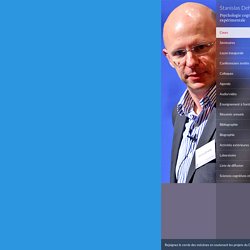
On s’accorde à penser qu’il faut étudier la capacité d’introspection pour elle-même, sans supposer qu’elle soit nécessairement juste, mais simplement comme une opération mentale dont les mécanismes et les limites restent à élucider. Retrouver une base saine pour mieux goûter la Vie par Isabelle Padovani. Amour, compassion, empathie et sympathie par Isabelle Padovani. Training structure, periodisation and the science of winning with Jan Olbrecht, PhD. Training structure, periodisation and the science of winning with Jan Olbrecht, PhD | EP#198 Jan Olbrecht is a former elite swimmer, holds a PhD in sports physiology and biomechanics, and has advised athletes who have won over 600 Olympic, World Championship, European Championship and Commonwealth Championship medals.

His main drive is to translate science to the level where coaches can benefit from it, and one of the main outcomes of this drive is his excellent and highly influential book 'The Science of Winning' on periodisation, training structure, and using physiology to deliver peak performances. Let's discuss this episode and the topic in general. Post any comments or questions in the comments at the bottom of the shownotes. Join the discussion here! World Champions keep things simple: training masterclass with Joel Filliol. How Norway became a triathlon powerhouse with head coach Arild Tveiten. How Norway became a triathlon powerhouse with head coach Arild Tveiten | EP#154 On 28 April 2018 Norway became the first nation ever to sweep a podium in a World Triathlon Series event when Casper Stornes, Kristian Blummenfelt and Gustav Iden showed the world what the "Norwegian train" is capable of.
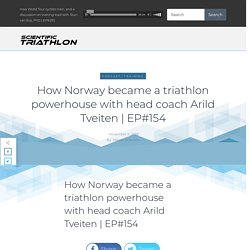
Arild Tveiten is the head coach of these athletes, and the man behind the transformation that is making Norway a true triathlon powerhouse. Let's discuss this episode and the topic in general. Training for time-crunched athletes with Conrad Goeringer. Perspectives on coaching with David Tilbury-Davis. Hermann Hesse on Little Joys, Breaking the Trance of Busyness, and the Most Important Habit for Living with Presence. “Of all ridiculous things the most ridiculous seems to me, to be busy — to be a man who is brisk about his food and his work,” Kierkegaard admonished in 1843 as he contemplated our greatest source of unhappiness.
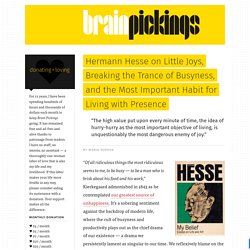
It’s a sobering sentiment against the backdrop of modern life, where the cult of busyness and productivity plays out as the chief drama of our existence — a drama we persistently lament as singular to our time. We reflexively blame on the Internet our corrosive compulsion for doing at the cost of being, forgetting that every technology is a symptom and not, or at least not at first, a cause of our desires and pathologies. Intuition of the Instant: French Philosopher Gaston Bachelard on Our Paradoxical Experience of Time. “All eternity is in the moment,” Mary Oliver wrote.
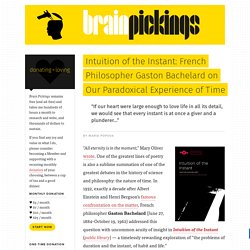
One of the greatest lines of poetry is also a sublime summation of one of the greatest debates in the history of science and philosophy: the nature of time. In 1932, exactly a decade after Albert Einstein and Henri Bergson’s famous confrontation on the matter, French philosopher Gaston Bachelard (June 27, 1884–October 19, 1962) addressed this question with uncommon acuity of insight in Intuition of the Instant (public library) — a timelessly rewarding exploration of “the problems of duration and the instant, of habit and life.”
There Is a Crack in Everything, That’s How the Light Gets In: Leonard Cohen on Democracy and Its Redemptions. Trained as a poet and ordained as a Buddhist monk, Leonard Cohen (September 21, 1934–November 10, 2016) is our patron saint of sorrow and redemption.

He wrote songs partway between philosophy and prayer — songs radiating the kind of prayerfulness which Simone Weil celebrated as “the rarest and purest form of generosity.” Albert Camus on the Will to Live and the Most Important Question of Existence. “If the universe is meaningless, so is the statement that it is so… The meaning and purpose of dancing is the dance,” Alan Watts wrote in his 1951 meditation on how we wrest meaning from reality.
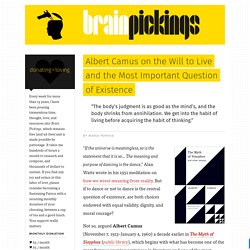
But if to dance or not to dance is the central question of existence, are both choices endowed with equal validity, dignity, and moral courage? Not so, argued Albert Camus (November 7, 1913–January 4, 1960) a decade earlier in The Myth of Sisyphus (public library), which begins with what has become one of the most famous opening sentences in literature and one of the most profound accomplishments of philosophy. A decade and a half before becoming the second-youngest recipient of the Nobel Prize in Literature, awarded him for the “clear-sighted earnestness” with which he “illuminates the problems of the human conscience,” 28-year-old Camus writes:
Kafka on Love and Patience. By Maria Popova One March morning in 1920, a Czech teenager named Gustav Janouch arrived at the Workman’s Accident Insurance Institution, where his father worked.
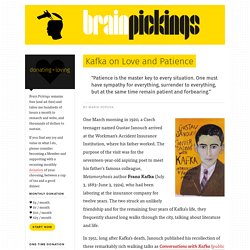
Philosopher Erich Fromm on the Art of Loving and What Is Keeping Us from Mastering It. “To love without knowing how to love wounds the person we love,” the great Zen teacher Thich Nhat Hahn admonished in his terrific treatise on how to love — a sentiment profoundly discomfiting in the context of our cultural mythology, which continually casts love as something that happens to us passively and by chance, something we fall into, something that strikes us arrow-like, rather than a skill attained through the same deliberate practice as any other pursuit of human excellence.
Our failure to recognize this skillfulness aspect is perhaps the primary reason why love is so intertwined with frustration. That’s what the great German social psychologist, psychoanalyst, and philosopher Erich Fromm (March 23, 1900–March 18, 1980) examines in his 1956 masterwork The Art of Loving (public library) — a case for love as a skill to be honed the way artists apprentice themselves to the work on the way to mastery, demanding of its practitioner both knowledge and effort.
A Unique Trust Placed in Chance and Eternity: How Real Love Begins and What Makes It Flourish Over Time. “An honorable human relationship … in which two people have the right to use the word ‘love,’” Adrienne Rich memorably wrote, “is a process, delicate, violent, often terrifying to both persons involved, a process of refining the truths they can tell each other.”
That transcendent turbulence of mutual truth-refinement is a centerpiece of the altogether fantastic In Praise of Love (public library) by French philosopher Alain Badiou (b. The Central Paradox of Love: Esther Perel on Reconciling the Closeness Needed for Intimacy with the Psychological Distance That Fuels Desire. “There is hardly any activity, any enterprise, which is started with such tremendous hopes and expectations, and yet, which fails so regularly, as love,” the great humanistic philosopher and psychologist Erich Fromm wrote in his 1965 classic on mastering the art of loving. Stendhal on the Seven Stages of Romance and Why We Fall Out of Love: Timeless Wisdom from 1822. Love is perhaps the most fertile subject of literature, music, and all the arts. Kurt Vonnegut believed you’re only allowed to be in love three times in your life.
It has been described as a matter of bravery, a limbic revision, the greatest insurance against regret. For Peanuts creator Charles Schulz, it is simply, sweetly walking hand in hand. We’re Breaking Up: Rebecca Solnit on How Modern Noncommunication Is Changing Our Experience of Time, Solitude, and Communion. The Confidence Game: What Con Artists Reveal About the Psychology of Trust and Why Even the Most Rational of Us Are Susceptible to Deception. 8 Ways to Develop Mental Toughness – The Mission. The Intelligence of Emotions: Philosopher Martha Nussbaum on How Storytelling Rewires Us and Why Befriending Our Neediness Is Essential for Healthy Relationships.
Et si nos émotions étaient au cœur de notre intelligence ? Qui, ne s’est pas déjà dit, lors d’une dispute familiale, ou d’un désaccord profond avec son équipe ou N+1, qu’il fallait absolument que « je mette mes émotions de côté, que je les ignore, ce n’est que comme ça que je vais pouvoir trouver LA solution » ! Avec souvent comme justification: « Ces émotions qu’elles soient positives ou négatives ne peuvent que desservir ma décision, me mettre sur une fausse route et en difficulté ».
What Does It Take To Thrive At Work? Have We Been Measuring Wellbeing Wrong? What is The Next Evolutionary Leap Forward in Leadership? Learn Which Of The 4 Tendencies You Are To Start Your Side Hustle Faster. How to Care Deeply Without Burning Out. Carol Dweck, founder of mindset theory, has written an ambitious new paper in Psychological Review. Take Action! You Have The Power To Boost Your Strengths.
July 17, 2018 by Dr. Reflected Best Self Exercise - Strengths. 10 Questions that Will Change the Way You Think About Your Problems. Les QUESTIONS en Coaching. 13 Emotional Intelligence Activities & Exercises (incl. PDFs & PPTs) How to Improve Emotional Intelligence in the Workplace (31 Tips + Activities) How To Improve Emotional Intelligence Through Training (Incl. Activities) MOOD METER APP. Eikos Concepts. Le spécialiste des formations participatives, actives et ludiques.
Emotional Intelligence Skills and How to Develop Them (Incl. Soft + Social Skills) All Models Are Wrong: How to Make Decisions in an Imperfect World. The Value of Time: How Much is Your Time Really Worth? How Decision Fatigue Steals Your Productivity (and How to Take it Back) How Fractured Focus Steals Your Productivity (and How to Take it Back) Productivity Thieves, Part 1/4. Productivity Thieves, Part 3/4: Toxic Habits and How to Break Them.
Tout le monde n’a pas eu la chance de rater ses études, d’Olivier Roland. Créer son entreprise pour devenir libre ! Tout le monde n’a pas eu la chance de rater ses études d’Olivier Roland. Transition énergétique et réduction des consommations. Being with Stressful Moments Rather Than Avoiding Them. David Le Breton : l'adolescence, cette période "désynchronisée des rythmes d'adultes" Petite synthese de noologie. Nietzsche avait tout compris. Marx n'avait rien compris. La pensée critique appliquée à soi. Esprit critique - Une fausseté répétée mille fois. Spiritualiser, c'est voir les âmes … L'Âme, clé de la Vie ! Une âme qui vous anime … Un regard philosophique. A propos d'indifférencialisme (En suivant Carlo Strenger) Le savoir dire, conformisme artificiel ou grammaire de la relation?
How To Overcome Pack Mentality In The Workplace By Fostering Psychological Safety. What's Your Feedback Flavor? How To Give Negative Feedback Beyond The Compliment Sandwich. 6 Mental Traps in Predicting Future Feelings. Want to Get Better? Learn to Take a Risk. Eight Reasons Why We Get Bored. L’enfermement par l’imagination ou l’entendement - Jérôme LECOQ. Le grand entretien avec Cynthia FLEURY (première partie) - Les Grands Entretiens de la SOP - SOP.
Le grand entretien avec Cynthia FLEURY (suite et fin) - Les Grands Entretiens de la SOP - SOP. Procrastinate Much? Manage Your Emotions, Not Your Time. Méditation sur la Beauté. » Rousseau. Désir et sagesse. La route du bonheur. » Le désir de reconnaissance est un désir d’esclave. Nietzsche. 3 Universal Ways That Elite Athletes Cope With Stress. SEVF : la boucle d’écoute gagnante (Stephen Karpman)